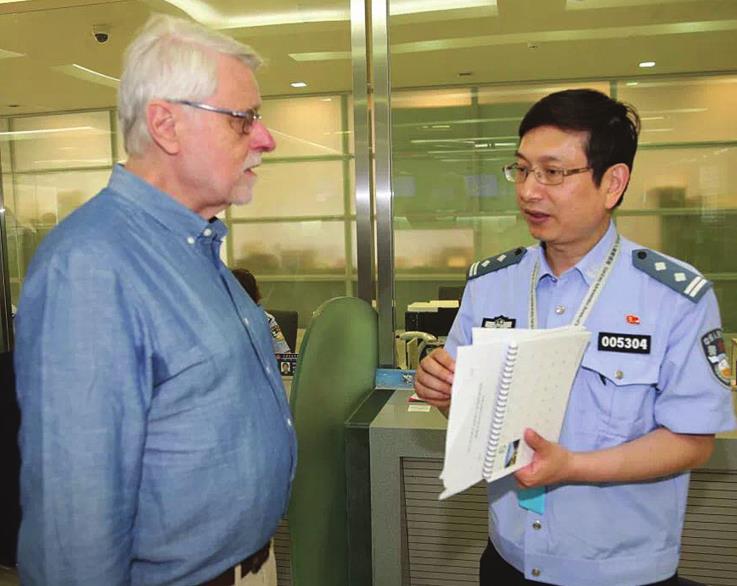Entrepreneurs make most of visa


Shanghai streamlines policies to welcome expatriates with innovative ideas
Romain Dessain-Gelinet, a graduate from the Rennes School of Business in France, received his entrepreneur visa in Shanghai earlier this month, paving the way for his pursuit of an augmented reality business in China.
The visa allows the 24-year-old, who has a master's degree in innovation and entrepreneurship, to stay in the country and start his own business within a year.
"This type of visa is what I really need right now," Dessain-Gelinet said. "The work visa is issued only if I am employed, but I am not looking for a job because I need free time to start my own company."
In order to get the visa, Dessain-Gelinet spent one month preparing his business plan for the Chinese market. The plan was based on his final year project in business school when he led a team of five people to create an augmented reality mobile app for marketing and social networking.
Dessain-Gelinet added that he will be bringing one of his French business partners to Shanghai in February to apply for the entrepreneur visa.
"Chinese people are more open to new technology, while the French like to do things the traditional way — that's why I see my product standing a bigger chance here than in France," Dessain-Gelinet told China Daily in his office at an incubator in the Hongqiao area of Shanghai.
He added that he has already found potential partners from event and marketing agencies, and that his project would have its first showcase on Jan 22.
"I did the initial evaluation of Dessain-Gelinet's business plan. It's a brilliant idea," said Wu Yanmin, a visa specialist at the K-Tech Hongqiao International Incubation Center.
The K-Tech center works with Shanghai Changning district's human resources department and science and technology committee to provide supporting documents for foreign entrepreneurs for visa application.
To apply for an entrepreneur visa, the applicant must submit materials such as financial statements to the municipal exit-entry administration bureau in person. Some individuals would be required to undergo a face-to-face interview or be asked to submit supplementary documents.
The approval process then takes just seven working days.
"This visa category has absolutely simplified the visa extension application procedure for expats in China, and it also provides another option for our team's international cofounders' future visa application," said Lars Traaholt Vagnes, who recently graduated from Shanghai Jiao Tong University.
The Norwegian, who majored in computer engineering, is one of the cofounders of Nusic, a startup empowering people with musical creativity through an artificial intelligence DJ platform. The company's China head office is located in Shanghai.
Vagnes said that he applied for the entrepreneur visa in September and was notified of its approval after six working days.
Shanghai has since 2015 launched 25 pilot visa policies to streamline the application process and diversify the visa types to meet the growing demand of foreigners wanting to enter China for various purposes.

According to Cai Baodi, chief of the foreigner visa management division at the municipal exit-entry administration bureau, recent graduates — within two years — from Chinese universities or from recognized overseas universities are eligible to apply for the entrepreneur visa.
Besides fresh graduates, veteran entrepreneurs who have sound business plans and the necessary documentation can apply for the visa which is valid for a year but can be extended up to two years.
Due in part to its favorable visa policies, Shanghai has for six consecutive years been voted by foreign expatriates as the most attractive Chinese city to work in, according to the State Administration of Foreign Experts Affairs.
Shanghai is already one of the most livable cities in the world, and it should aim to double its foreign population over the next four to five years, said Ranga Vellamore, cofounder of Shanghai-based Zeta-V Technologies, who has lived in the city for 12 years. He suggested that the city government can attract more high-caliber workers from abroad by building more professional incubators in areas such as robotics, internet of things and artificial intelligence.
Shanghai has the largest expatriate population among all Chinese cities, with its population of 215,000.
More than 100,000 working visas have been issued to expats in Shanghai since 2016, with more than 18 percent of them being talent visas.
However, only around 100 entrepreneur visas were issued in the past three years since its inception, according to the municipal exit-entry administration bureau. The lack of publicity has been cited as one of the reasons. Zhu Peiyi, the managing partner of the incubator in Hongqiao, pointed out that many foreign businessmen still do not know about the entrepreneur visa.
Another reason could be that there aren't many people who require such a visa, said Christina Wang, a professional who specializes in the Chinese visa service in Shanghai.
"Such a visa is mainly for foreign students or young startups with limited resources," said Wang, adding that those who have a stable investment in China with sound taxation records can apply for a residence permit, while those who are considered high-level personnel or whose skills are urgently needed in the country can get a talent visa.
Dessain-Gelinet said that he will be registering his company in Shanghai soon.
"People have told me that you need to act fast in China," he said. "I will also hire some Chinese to help me develop the business."
Vagnes is also optimistic about his business prospects, noting that Shanghai is full of energy and opportunity.
"Entrepreneurs here are willing to share and communicate with each other. I am inspired by people here who are doing big projects, and I want to be one of them," he said.




































